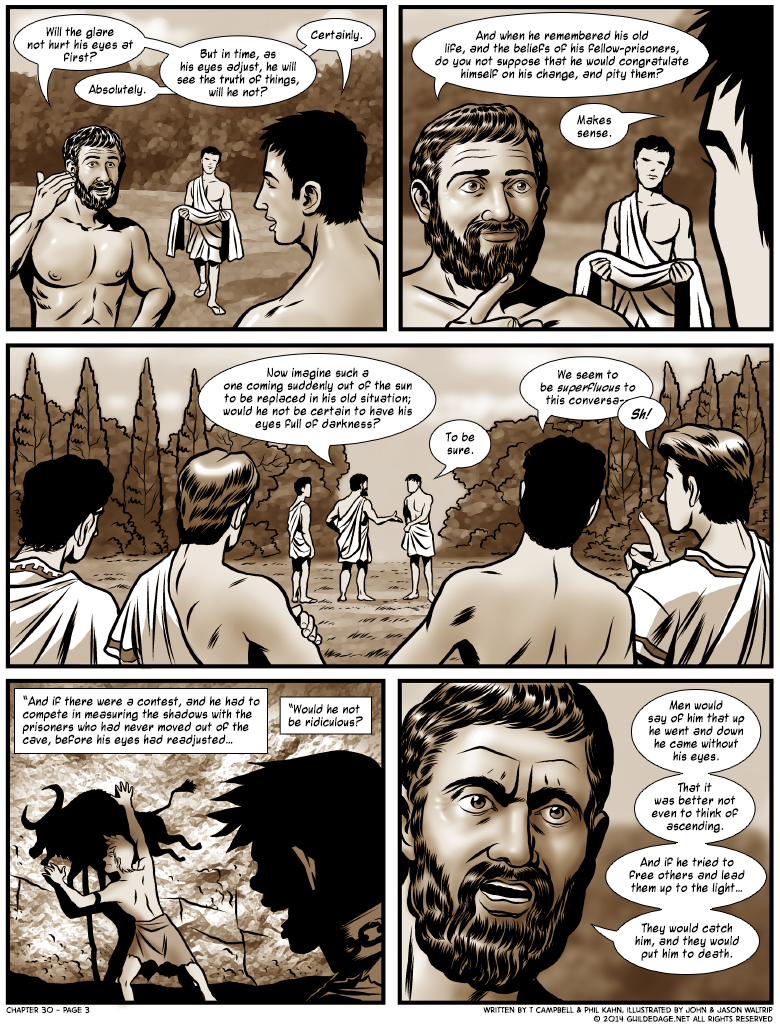Annotated 31-3
 That last frame sticks in the mind, all right. It’s an expression of an unfortunate fact of human life, and while few of us have risked outright death to show our friends the light, the current era has made it clear that militant ignorance is far from behind us.
That last frame sticks in the mind, all right. It’s an expression of an unfortunate fact of human life, and while few of us have risked outright death to show our friends the light, the current era has made it clear that militant ignorance is far from behind us.
Of course, others resisting you is not proof that you’re right. There was Jesus Christ, but there are also real-life cult leaders not too far off from Brother Tom.
Here’s the rest of the passage we condensed for this page, if you really feel like reading today:
At first, when any of them is liberated and compelled suddenly to stand up and turn his neck round and walk and look towards the light, he will suffer sharp pains; the glare will distress him, and he will be unable to see the realities of which in his former state he had seen the shadows; and then conceive some one saying to him, that what he saw before was an illusion, but that now, when he is approaching nearer to being and his eye is turned towards more real existence, he has a clearer vision, what will be his reply? And you may further imagine that his instructor is pointing to the objects as they pass and requiring him to name them, will he not be perplexed? Will he not fancy that the shadows which he formerly saw are truer than the objects which are now shown to him?
Far truer.
And if he is compelled to look straight at the light, will he not have a pain in his eyes which will make him turn away to take and take in the objects of vision which he can see, and which he will conceive to be in reality clearer than the things which are now being shown to him?
True, he now would.
And suppose once more, that he is reluctantly dragged up a steep and rugged ascent, and held fast until he is forced into the presence of the sun himself, is he not likely to be pained and irritated? When he approaches the light his eyes will be dazzled, and he will not be able to see anything at all of what are now called realities.
Not all in a moment, he said.
He will require to grow accustomed to the sight of the upper world. And first he will see the shadows best, next the reflections of men and other objects in the water, and then the objects themselves; then he will gaze upon the light of the moon and the stars and the spangled heaven; and he will see the sky and the stars by night better than the sun or the light of the sun by day?
Certainly.
Last of he will be able to see the sun, and not mere reflections of him in the water, but he will see him in his own proper place, and not in another; and he will contemplate him as he is.
Certainly.
He will then proceed to argue that this is he who gives the season and the years, and is the guardian of all that is in the visible world, and in a certain way the cause of all things which he and his fellows have been accustomed to behold?
Clearly, he said, he would first see the sun and then reason about him.
And when he remembered his old habitation, and the wisdom of the den and his fellow-prisoners, do you not suppose that he would felicitate himself on the change, and pity them?
Certainly, he would.
And if they were in the habit of conferring honours among themselves on those who were quickest to observe the passing shadows and to remark which of them went before, and which followed after, and which were together; and who were therefore best able to draw conclusions as to the future, do you think that he would care for such honours and glories, or envy the possessors of them? Would he not say with Homer, “Better to be the poor servant of a poor master, and to endure anything, rather than think as they do and live after their manner?”
Yes, he said, I think that he would rather suffer anything than entertain these false notions and live in this miserable manner.
Imagine once more, I said, such an one coming suddenly out of the sun to be replaced in his old situation; would he not be certain to have his eyes full of darkness?
To be sure, he said.
And if there were a contest, and he had to compete in measuring the shadows with the prisoners who had never moved out of the den, while his sight was still weak, and before his eyes had become steady (and the time which would be needed to acquire this new habit of sight might be very considerable) would he not be ridiculous? Men would say of him that up he went and down he came without his eyes; and that it was better not even to think of ascending; and if any one tried to loose another and lead him up to the light, let them only catch the offender, and they would put him to death.
No question, he said.











Either use logic to enlighten others which is seen as illogic, or create new shadows through storytelling that will take people out of the cave.
Logic, or stories, from someone claiming revelation but seeming demonstrably inferior probably wouldn’t land.
Using the shadows to play on their misguided beliefs, while maybe noble in intention, is engaging in willful deceit. Not to mention that not everyone who is lost wants, or would prefer, to be saved.
Not saying you’re wrong; just that shtuff’s complicated.
Why allot of Plato’s stuff can be interpreted differently by different people. While the Republic can encourage enlightening, it can also be interpreted as the ignorant will always be ignorant and the enlighten can only talk down to them (the Philosopher Kings bit)
Traditional ending in Russian folktales
“The Dreamer awakes
The shadow goes by
The tale I have told you,
That tale is a lie.
But listen to me,
Bright maiden, proud youth
The tale is a lie;
What it tells is the truth.”
Could not agree more. I love metaphors.
He could stand in the entrance and make new shadows or block the old ones. Checkmate, cavetheists!
The thing is: He could use that ability to prove to its inhabitants what he learned (as long as he is able to go back to the cave and move around in it freely). — but would they want to know this stuff unless they believed that they could ever get out of the cave themselves? Otherwise they’d be just as likely to be offended (understandably so!) if he tells them all this amazing stuff they’ll never get to see.
“That’s a nice holiday you had out there, thanks for telling me all about it, I also enjoyed my time in this dank cave which I’ll spend the entire rest of my life in, thank you very much …”.
Following on the comment from yesterday from someone pointing out that there are 5 prisoners who vaguely resemble our main party guys, the dude in the 4th panel resembles Payet Best. This was foreshadowing all the time.